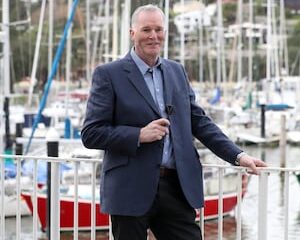Business
Asia Pacific Enterprise Awards Celebrate Responsible Business Leaders

The Asia Pacific Enterprise Awards (APEA) and the Asia Responsible Enterprise Awards (AREA) recently recognized outstanding business achievements and leadership during a ceremony in Shanghai on July 11, 2025. Organized by the prominent regional nonprofit, Enterprise Asia, the event celebrated innovative enterprises and leaders committed to sustainable growth in a rapidly evolving economic landscape.
The dual awards ceremony took place at the Grand Hyatt Shanghai, where over 150 nominees were rigorously evaluated across various categories. The AREA acknowledged organizations demonstrating a steadfast commitment to sustainability and responsible business practices, while the APEA focused on exceptional performance and visionary leadership.
In his opening remarks, Datuk William Ng, Vice Chairman of Enterprise Asia, emphasized the importance of innovation and responsibility in today’s business environment. He stated, “In an era marked by unprecedented challenges and transformation, it is the enterprises and leaders who dare to innovate, uphold responsible business values, and commit to sustainable progress that will define the future.”
Among the notable winners of the AREA, Town Ray Electrical (Huizhou) Limited received accolades for its environmental stewardship within the Green Leadership category. The company successfully implemented initiatives such as upgrading waste gas treatment systems, utilizing low-VOC materials, and installing energy-saving equipment, resulting in a reduction of VOC emissions by 3.699 tons, carbon emissions by 2,792 tons, and achieving 100% packaging recycling.
In the Corporate Governance category, E. SUN Bank (China) Company, Ltd. earned recognition for its commitment to strong governance practices, marking its second consecutive win. The bank maintains a record of transparency and accountability, with fully documented Board meetings and independent performance reviews, achieving over 98% customer satisfaction for three years.
The Bank of China (Hong Kong) Limited was also honored with dual awards in the Social Empowerment and Corporate Sustainability Reporting categories. Its longstanding initiative, ‘BOCHK x Food Angel’, has benefited over 210,000 individuals by recycling 8,800 tonnes of surplus food and producing more than 2.1 million meals, significantly reducing food waste and supporting community dignity.
Another significant award was conferred to China Hongqiao Group Co., Ltd. in the Corporate Sustainability Reporting category. The company outlined ambitious goals in its latest sustainability report, including peaking emissions by 2025 and achieving net-zero emissions by 2055, alongside increasing green electricity usage to 70% by 2030.
Techtronic Industries (TTI) received recognition under the Social Empowerment category for its initiative ‘Building Resilience, Empowering Communities’. Collaborating with Habitat for Humanity, TTI addressed various societal challenges by constructing new homes and improving infrastructure for over 1,800 individuals.
Other notable winners included industry leaders such as Alibaba’s Taobao Tmall Group: Xianyu Platform, China Construction Bank Corporation, and JD.com, Inc.. In the APEA segment, Kaishan Group Co., Ltd. and CTF Services Limited were recognized for their remarkable business achievements.
The APEA and AREA 2025 China Chapter were co-organized by Enterprise Accelerator Co., Ltd. and supported by various organizations, including the Hong Kong Young Industrialists Council Limited and the International Chamber of Commerce – Hong Kong. PR Newswire served as the official news release distribution partner for the event.
This year’s awards not only highlighted the importance of business excellence but also underscored the critical role of responsible leadership in fostering sustainable development within the region.
-

 Sports1 month ago
Sports1 month agoNetball New Zealand Stands Down Dame Noeline Taurua for Series
-

 Entertainment1 month ago
Entertainment1 month agoTributes Pour In for Lachlan Rofe, Reality Star, Dead at 47
-

 Sports1 month ago
Sports1 month agoSilver Ferns Legend Laura Langman Criticizes Team’s Attitude
-

 Entertainment2 months ago
Entertainment2 months agoKhloe Kardashian Embraces Innovative Stem Cell Therapy in Mexico
-

 Sports2 months ago
Sports2 months agoGaël Monfils Set to Defend ASB Classic Title in January 2026
-

 World3 months ago
World3 months agoPolice Arrest Multiple Individuals During Funeral for Zain Taikato-Fox
-

 Politics2 weeks ago
Politics2 weeks agoNetball NZ Calls for Respect Amid Dame Taurua’s Standoff
-

 Entertainment3 weeks ago
Entertainment3 weeks agoTyson Fury’s Daughter Venezuela Gets Engaged at Birthday Bash
-

 Sports3 weeks ago
Sports3 weeks agoHeather McMahan Steps Down as Ryder Cup Host After Controversy
-

 Entertainment3 weeks ago
Entertainment3 weeks agoTyson Fury’s Daughter Venezuela Gets Engaged at Birthday Bash
-

 World2 weeks ago
World2 weeks agoNew Zealand Firefighters Plan Strike on October 17 Over Pay Disputes
-

 Sports2 months ago
Sports2 months agoTragic Death of Shane Christie Sparks Calls for Player Safety





















